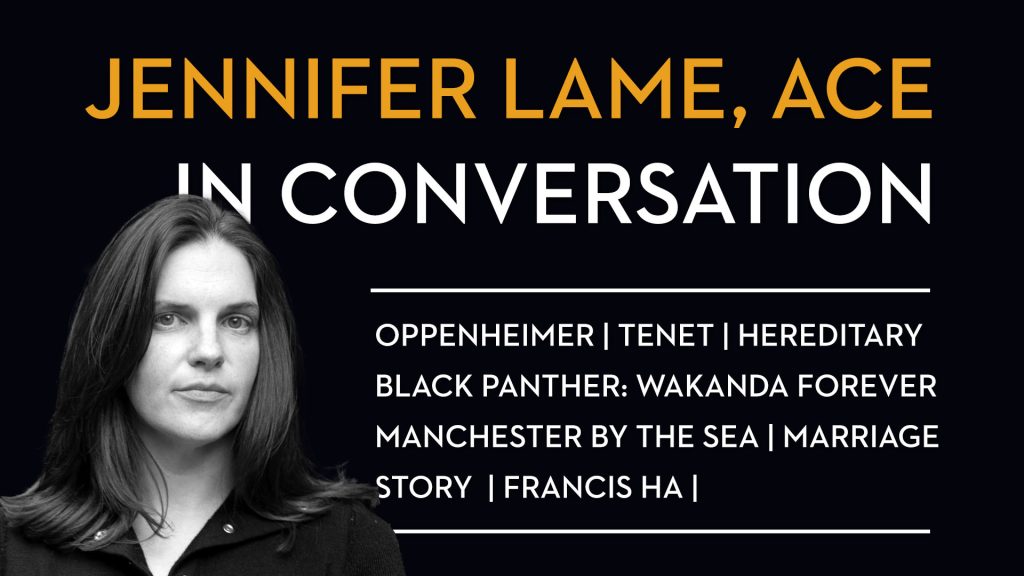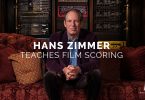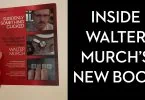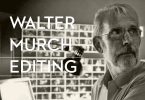
How do you get to be Christopher Nolan’s editor?
By cutting critically acclaimed films back to back (Manchester By The Sea, Hereditary, Marriage Story) and then sharing a common creative language. Or at least that’s what Christopher Nolan said when he was asked about his hiring of Jennifer Lame, ACE for Tenet and then Oppenheimer.
“For me, hiring is about looking at the work people have done in the past, but not necessarily in relation to what you’re looking to do. I look for excellence and judgment.
Christopher Nolan, ICG Magazine Interview
When meeting, it’s more about discovering if there’s a common creative language, which is exactly what turned out to be the case.”
Jennifer joins only two other editors who have worked for Nolan, with his previous editor, Lee Smith, ACE having every film he had made since Batman Begins (2005), with only his breakout indie hit Memento and first studio film Insomnia being edited by Dody Dorn.
Her career got it’s start working as an assistant editor on projects such as The Lovely Bones and 30 Rock, and then her second feature Francis Ha, established her long-running collaboration with director Noah Baumbach.
Jennifer also has additional editor credits on films such as Midsommar, Judas and the Black Messiah, and Blonde.
So then when you get 30 minutes to chat with an editor with the industry standing and creative accumen of Jennifer Lame, what in the world do you talk about?
Well I don’t know but this is what we spoke about…
- How she builds a scene from scratch
- Why you need to learn new approaches with every film
- Only having four weeks to rough cut Oppenheimer
- Working with writer-directors
- Building an enduring editorial career
- Collaborating with Christopher Nolan
- Where does she go from here?
Read through our conversation below, or listen in with the video above.
Interview with Christopher Nolan’s Editor, Jennifer Lame, ACE
Thanks to Rachel A for connecting me with Jennifer!
Here is a transcript of our conversation, lightly edited for clarity.
What’s your daily work routine? When you’re in the trenches of the creative part of the edit, when it’s just you and the footage.
During the assembly? For me, it’s a very different process during the shoot and the assembly versus working with the director.
I feel like that’s almost the more daunting part of it. But over the years, I’ve tried to come up with different ways to tackle that part of it because it can be really stressful, or there are days where not much is going on, and it’s hard to structure your time, during that whole section.
For me, it’s coming in, talking to my crew, relaxing, figuring out what’s happening on set. And then just hyper-focusing, for hours, an hour at a time; “Okay, how much can I get done in one hour?” And I found that after years of attacking the assembly, that works the best for me.
Just mini goals. Because I think tackling a whole assembly can be very overwhelming. Even just the first stabs at putting the film together. It’s like starting anything, you know?
So I think for me, it’s structuring my day so I can find some joy in the day and have lunch with my crew or run an errand and then put timers on for like 30 minutes. I’m gonna spend 30 minutes on this scene and see how many different versions I can cut and what I learn in the next 30 minutes. I’m gonna live in this scene and then try to move on.
The other thing is you don’t want to get bogged down in something. But I can get very bogged down in things, and managing that is difficult, but I’ve found ways to do it.
How do you go about building a scene from scratch?
I know from Steve Hullfish’s interview, you used to create a string out of each line, take by take, to then pick the best take and stack them or lift them up, one or two tracks, to indicate whichever one you prefer best.
But then are you thinking, “Oh, there’s this close-up that I wanna build to”, and work backwards from that? Or do you start from the beginning of the scene, or I know the editor of Life of Pi, would cut together only all the wides, the whole scene is just wides, and then he’d cut all the close-ups, and he’d cut all the medium shots, and then he would mash together the three different scenes that he’d made to pick the best of the best, and see if it worked together.
Can you talk me through your process of tackling a scene, or does it change every time?
Yeah, I think that’s a really good idea. Is that Tim Squyres? (Yes) I’m gonna steal that one. I think I’m gonna steal that one because what I’ve learned is, I worked for one director (Noah Baumbach) for a really long time and that’s the method I learned from him, the one you just mentioned.
But then I’ve learned that it’s actually okay to be flexible and deviate from that. So with Chris’s movies, they don’t necessarily jive with that process.
But I think every movie is different, which is why I was like, I’ll steal that Tim Squyre’s thing for one movie. And I think it’s actually really important to do that as an editor. Something I’ve learned actually about myself is – because I was in kind of that rigid mode for a while where I did that one specific method – is that changing things up is actually good for your brain and good to get you out of rhythms and to discover new things.
So on this movie, Oppenheimer, it was really different for me because I came in after the movie had wrapped.
A lot of editors are actually really daunted by that because I asked a couple of editors, do you think this is a good idea that I’m doing this? And a lot of them are like, ‘Don’t do it!’
I mean, obviously, do it, but it’s going to be really hellish because you’ll have just all the footage lumped together and only a couple of weeks to cut it, as opposed to getting in footage incrementally over the shoot.
But I actually found I really loved it, because in a way, the incremental-ness of production, I realized I found, kind of stressful.
I’ve found ways to deal with it, but the idea of having the enormous task of having all the footage and just three or four weeks to cut it all together, because it was so enormous, it almost became meaningless in a way. It was like, “Okay, I can only do what I can do.“
And so I actually really relaxed into it, and I had the best time ever.
I wouldn’t like to pitch myself to do that on every movie! But it was also just a cool way to be forced to do something different.
This is why I learned I can do it differently each time and I can still edit a good movie. And it allows you to trust your instincts as an editor and see that, I’m not just my methods if that makes sense.
This is a creative task. And that’s why I find it difficult to talk about editing because it’s a creative, intuitive task of putting the film together. It’s very hard to talk about how you do that, but I think gaining confidence as an editor is putting yourself through many different experiences that are new and scary.
And it’s funny that you asked me that question. This is a really interesting question that you’ve asked me because, for a long time, I felt like if I didn’t do the method that you mentioned in the beginning that I was like gonna fuck up my whole editing kind of flow. And so I was almost afraid to do it differently.
I remember on Tenet I was desperately trying to do that method, but it wasn’t working in the sense that there was too much other stuff to do. It didn’t really translate to some of the action stuff.
And it was freeing to think, “Okay, I just have to do something different and just edit the movie. I don’t need my methods to edit a good movie.“
A lot of editors will say you edit from your gut, as opposed to strategically thinking through step by step. Because I know some editors will break down the script and they’ll be thinking, ‘This is the key line, and I wanna be on the reaction for that thing.” etc.
But do you just respond to the performances in the footage and remember, “Oh yeah, there was a great shot in here”, and you might not be thinking, ‘This is exactly why I like it’, but you just gravitate towards it?
Would you say that’s how you find your way through the footage? Or is it a combination of logic, “It’ll be more powerful if we’re in a closeup than it will be if we’re on the wide.”
Although conversely, In Manchester By The Sea, there are some amazing scenes where it’s mostly a wide shot, and the performance is so strong that it draws you in any way.
I think just being honest with yourself, as a person who loves films. And so if I’m just watching a scene and I start watching the footage and I just start watching it and I can’t stop watching it, or to your point, one particular performance I find riveting, I’ll grab that and try to make it work with that.
And then I’ll spend 15 minutes on that and it doesn’t work at all and it’s terrible and then I’ll go back and keep watching the footage.
So a big thing about editing is not being afraid when you go down a rabbit hole of coming back out of it. Because I think with editing, you can get really lost in those kinds of rabbit holes and that’s why I think the Tim Squyres’ thing is so smart too. It’s the idea that you cut it on wides, cut it on close-ups, make a mishmash and then that could be a complete failure too. But through that failure, you find this successful thread. And I think that’s what’s so interesting about editing.
It’s so fascinating, too in the sense of how would two different people edit the same movie, and would it end up being the same movie? Like, who knows?
There are so many daunting, rabbit hole weird things you can go down with that road, and that my brain quickly goes down, that I just have to stop my brain from going down there.
So, but that’s why I’m maybe good at my job because I am obsessive and can go down those rabbit holes but I need to bring myself out of those rabbit holes.
But I can cut a scene 30 different ways, and I find that exciting, not annoying, so I’m just always up for experimentation.
I once interviewed Julia Block, who’s another editor from New York.
Oh yeah, I know her.
She worked on a Terrence Malick movie a long time ago, but she said they had this organic, freeform, try-anything in editorial flow and different editors were swinging in and out at different times. And it sounded like that would be super fun and you would get lost in it.
But then without the constraint of, “Hey, you’ve got to get Christopher Nolan’s movie cut in four weeks”, as opposed to Terence Malick’s two years of, “Let’s just see what happens”.
Yeah, to that point, one of the things I admire and love about working on Chris’s movies is that there are a lot of rules and constraints and he hits deadlines and time feels very important to him. You know, the clock is running, and you’re just trying to hit those deadlines and get work done, but also I feel like within the time it is incredibly relaxed, and creative and free-flowing, and it’s like this weird dichotomy of both very rigid and not rigid at all and incredibly creative and free-flowing.
So I think I’ve learned a lot from working on two movies with him, to have that interesting theoretical Terrence-Malicky-flow but also not go too far with it if that makes sense?
But it’s very interesting that Julia mentioned that. It’s crazy.
She’s such a great editor as well.
Yeah, I love her.
When working with Chris, does he like to sit in the whole time or does he pop in and out and see things? I saw an interview where he said that, you guys didn’t really do an assembly per se in terms of the whole movie back to back, but you did each scene and then he’d rework each scene with you.
How did that whole assembly process go? Did you just have the first four weeks by yourself and then kind of transition to working with him or how does that collaboration work?
In this particular case, because I missed the production, he gave me four weeks to work with the footage. And he was really sweet and said, “I don’t expect you to cut this whole movie in four weeks. Obviously, that’s insane. But I do want you to get familiar with the footage as if you were on the shoot. So I want you to watch all the footage, but I don’t expect you to cut the whole thing.”
But I actually ended up cutting the whole film because in order to watch all the footage, you just naturally want to throw shit in a timeline that you like. So I ended up doing a rough pass of the whole film just because it felt silly not to because that’s what my brain does anyway.
But see, the thing about Chris, and I learned this on Tenet, is that he doesn’t watch an assembly from beginning to end – but again most director writers don’t do that.
I’ve typically only worked with director/writers – because their brains can’t comprehend that, and I think it’s so brilliant of them that they don’t because, and Chris and I have spoken about this before, an editor’s assembly is just my first rough kind of ideas of the movie.
It’s not me presenting the film as like, “Here’s your movie!” Or, “Here’s what I think of your movie!”
And so it’s so daunting this idea that a director would come in and sit and watch your entire rough cut, you know? Of course, there’s gonna be problems. And I don’t even know how beneficial that is necessarily.
However, I know a lot of directors do find it beneficial because they need to wrap their heads around the whole mess of it all.
But I think for writer/directors, they’re used to writing and that doesn’t make sense to them. To them it’s like you watch the first couple scenes and then you’re like,”Okay, we know what we need to do. Let’s go start doing it.” And then you work on those couple scenes. And then you watch those couple scenes with the next couple scenes.
And then you might win the fucking lottery and there’s one or two scenes that are pretty fucking good and that you keep, and then you move on, which happens sometimes, which is really fun for me. Where I’m like, “Oh. That actually works.“
But it’s never the scenes that I think are gonna work.
On Oppenheimer, it was always funny when we’d go to watch the next scene and I’d be like, “Oh God…”, and Chris would say, “Stop saying that.” But it was always funny because the scenes that I would be the most embarrassed about usually had the least amount of issues. It was so fascinating.
And then the scenes that I was like, ‘This one’s good, he’s gonna like this one’, it was like, “Wow, we need to start from scratch.” You know what I mean? It’s such a good lesson in humility and having no ego. But it’s really fun, and that’s how we do it.
That said, the whole film needs to be cut because every time we start fine-cutting the scenes, then he wants to watch like the next 20 minutes, so it has to exist. So it’s kind of funny that he said, “Don’t worry about putting it all together.” because I knew that he actually did expect me to put it all together, but he was trying to be nice.
But there’s no temp music, and I don’t put temp effects or anything like that. He doesn’t expect any of that, whereas some directors do. They expect a full temp score, full temp sound effects etc. So I really appreciate that I’ve never really worked on a film like that before.
I think with Ari, he wanted that because it was his first film and he needed that. So on Hereditary, I did it, but that was so hard because it was a horror movie. So I had to put all of these crappy temp sound effects in, and that was scary.
Yeah, I remember Julia saying, because she has done quite a lot of horror stuff, how so much of cutting horror is about the fine execution at the end because somebody creeping down a corridor can be either terrifying, depending on the timing, the pacing, and the sound effects and everything, or really comical, because it hasn’t got the score in and the creepy sound effects and it’s like…
Totally, totally.
In some ways, it’s maybe a harder genre to rough cut. But I mean, I still can’t believe you managed to cut the whole thing in four weeks!
I mean, again, a really, really rough version of it. And then the one funny thing I’m sure you heard if you’ve listened to me is that I kind of breezed over Trinity. I didn’t really spend much time with it because I knew that Chris and I would spend – we’d have a couple of days where we did that. And I knew Trinity was going to be amazing. I saw the footage. So I threw a couple of shots together and moved on. You know what I mean?
Which makes sense with what you’re saying about not going down the rabbit hole; we will get to that (Trinity) rabbit hole later and you’re not going to worry about it for now.
With where you’re at with your editorial career. I guess my question now is, where do you go from here?
I know, I know, I don’t know.
It’s so funny that you say that because I just went to a little gathering of people who worked on Oppenheimer just to say hi and reconnect. And we all just talked about how much we loved working on the movie. I was talking to Ellen, the costume designer, and she was remembering this was such a satisfying experience creatively for most heads of the departments and I’m sure all of the actors.
So, I don’t know where I go.
I just did this sphere project with Darren Aronofsky, which was actually a really good, fun, palette cleanser after Oppenheimer, because it was so different. Darren is amazing, and it was really fun to meet like a new filmmaker.
Creatively speaking in terms of doing another scripted movie project? Oppenheimer was so fun, I don’t know. No idea.
Are there other directors that you want to work with?
I’ve been really lucky to work on different genres, which I think some editors get pigeonholed with specific genres. For a while, I was just working with Noah Baumbach and then I did Manchester by the Sea, (Director Kenneth Lonergan) but then Ari Aster came along and hired me on Hereditary, and that was such a gift actually because I’d never done horror. I wasn’t really interested in it, and he kind of talked me into it.
It was also really cool to work with a younger filmmaker. He was younger than me and it was his first feature. So actually I wouldn’t mind doing that again.
And also I got to work with Ryan Coogler on Wakanda Forever and I’d never really worked on a big superhero movie before, but also Ryan comes from, Fruitvale, and he’s such an amazing writer, director, and filmmaker. So it was fun to work with him.
And so I just want to work with people that I find interesting. But it’s hard to meet new people. I would just like to work with Ryan again or Ari again or Chris again, because it is such an intense relationship. But again, I was feeling that way after this movie, but then I met Darren Aronofsky and I had the best time.
I’d have thought that most filmmakers would be beating a path to your door to get you on their next project, so then you can pick and choose hopefully which projects suit you best?
A lot of directors already have editors, you know? So another interesting aspect is, if I wanna have a nice long, fruitful career is establishing relationships with younger directors. So it was really great to meet Ari, and Ryan Coogler was quite young and has a long career ahead of him.
And he has a production company, Proximity Media, so I would love to work on things he produces because he produces and works on really interesting projects with some political implications. I want to work on movies that are meaningful. So yeah, maybe I need to work with other younger directors too.
That’s the thing about editing is that a lot of directors have relationships with editors and it’s such a specific relationship that you don’t really want to change. So it’s hard whenever people are like, “Who would be your fantasy director?” Does it really matter? Because some of those fantasy directors probably already have a really great editor, you know?
It is a bit like a marriage when you sit there for so long with them in some ways. Or at least it’s such a multi-layered relationship in terms of things said, things not said, trying to gauge their reactions and just the mileage of being in the same room for so long.
Yeah, and I really like working for writer-directors and there’s not a ton of those. So it’s a hard thing to find.
One thing I was gonna ask you about, which I haven’t heard many people talk about, which is the role of the editor as an HOD, as a Head Of Department within a big project like this.
Did you have to shoulder all of that responsibility, or can you hand some of that off to your first assistant in terms of running a team? Because you had to find and hire specific people and you’re managing a whole department. How do you do that?
Yeah, well it’s funny, because I came from that New York smaller movie budget world. So I really ever only had one assistant or maybe I had two assistants, actually I don’t think I ever did.
So then when I came onto Tenet it was crazy. It was a huge department and luckily the first assistant editor stayed on. This guy John Lee, who’s amazing and had worked on like 10 of Chris’s movies.
So he became my best friend, and we got along so well. He was so kind to me because there was so much I didn’t understand about it, it was just a different process, what they do with the film stuff and the different formats that they shoot and all that stuff.
Luckily because me and John had become so close, in a way he ran that department for sure. But then he moved on to become an editor and couldn’t do Oppenheimer. So I was tasked with finding a replacement for him, and it was incredibly daunting.
Not a lot of people can do that job. It’s really technically complicated but also you have to be quick on your feet, you have to learn a bunch of new shit, you have to talk to so many different people.
So anyway I had to find his replacement and then on Oppenheimer I definitely felt more like I was in charge of the department just because the whole team was new, so I was the veteran this time, which was really funny, even though I’d only done one other movie.
And then Tina Anderson, the post-producer who did Tenet with me, it was like the two of us together and she’s brilliant. She works on all of Tarantino’s movies, and all of Ben Affleck’s movies. She’s very familiar with the film world and all of this stuff. So between the two of us, we were able to kind of like run the department and also have fun.
Everyone was so nice and sweet and funny and smart. And it was a great team. So I guess my approach I finally learned, because this idea of being a Head of Department and running a team was always very daunting to me. But my approach now that I’ve done it, cause I would say Oppeheimer was the first time I had to really be the HOD in the sense that, I knew what I was doing this time!
So my approach is to have fun because these jobs can be so time-consuming and so stressful and so to find ways to make it not stressful and make people laugh. We always had funny jokes going and working on these movies can be exhausting and you’re away from your family, so if you’re gonna not put your kids to bed, you better have a couple of laughs at dinner. You know what I mean?
And the hours are brutal in this industry, so just finding fun ways to get through it, I think is my approach.
That makes a lot of sense when you’re in a position where you can set the culture of how you want the department to feel and then that sets the experience for so many people who are underneath your leadership.
Yeah, and if you want people to come back and do it with you again, you better make it not torture. (Laughs)
Jen, thanks so much for your time. We’ve got to finish, but I really appreciate getting to chat. Oppenheimer was obviously, as one of millions of other people who thought it was outstanding, as well as all of your other credits are clearly outstanding.
Thank you. It was so fun to talk to you.




